 Petzlover
Petzlover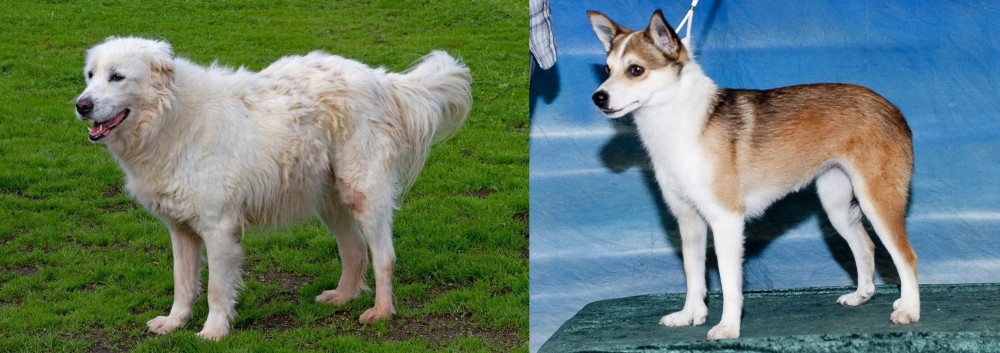 Abruzzenhund is originated from Italy but Norwegian Lundehund is originated from Norway. Abruzzenhund may grow 33 cm / 13 inches higher than Norwegian Lundehund. Abruzzenhund may weigh 36 kg / 80 pounds more than Norwegian Lundehund. Both Abruzzenhund and Norwegian Lundehund has almost same life span. Both Abruzzenhund and Norwegian Lundehund has almost same litter size. Both Abruzzenhund and Norwegian Lundehund requires Moderate Maintenance.
Abruzzenhund is originated from Italy but Norwegian Lundehund is originated from Norway. Abruzzenhund may grow 33 cm / 13 inches higher than Norwegian Lundehund. Abruzzenhund may weigh 36 kg / 80 pounds more than Norwegian Lundehund. Both Abruzzenhund and Norwegian Lundehund has almost same life span. Both Abruzzenhund and Norwegian Lundehund has almost same litter size. Both Abruzzenhund and Norwegian Lundehund requires Moderate Maintenance.
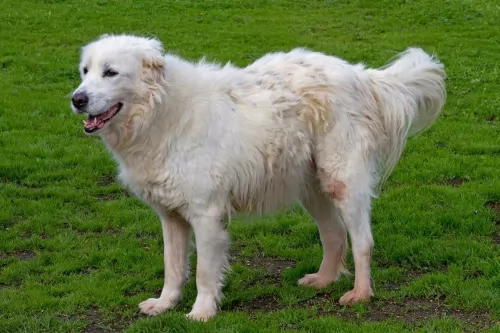 Abruzzenhund was established as an individual breed in the middle of the 20th century. They are descendant of the big, white Eastern sheepdogs which came to Europe 2000 years ago. Abruzzenhund is a mix of Turkish sheepdogs Akbash and Karabash, the Kuvac, Slovakian breed Hungarian breed, Komondor, and a French sheepdog Pyrenean Mountain Dog. Those dogs were much bigger than today’s breed. Abruzzenhund is still not very popular breed, but it is very common in Great Britain and Italy. They have been used as guard dogs, hunting dogs, and working dogs because they are very brave and strong.
Abruzzenhund was established as an individual breed in the middle of the 20th century. They are descendant of the big, white Eastern sheepdogs which came to Europe 2000 years ago. Abruzzenhund is a mix of Turkish sheepdogs Akbash and Karabash, the Kuvac, Slovakian breed Hungarian breed, Komondor, and a French sheepdog Pyrenean Mountain Dog. Those dogs were much bigger than today’s breed. Abruzzenhund is still not very popular breed, but it is very common in Great Britain and Italy. They have been used as guard dogs, hunting dogs, and working dogs because they are very brave and strong.
 The Norwegian Lundehund hails from the island of Vaeroy, Norway and was created for the purpose of puffin hunting.
The Norwegian Lundehund hails from the island of Vaeroy, Norway and was created for the purpose of puffin hunting.
Now that these puffins are a protected species, the dog is no longer used for hunting and has become a companion dog.
The breed decreased in numbers during- and after World War II because the islands where he came from had an outbreak of distemper. It was in 1963 that another outbreak occurred and the dogs were almost wiped out. A breeding program saw their numbers being built up.
It was in 2011 that the dog was recognized by the American Kennel Club.
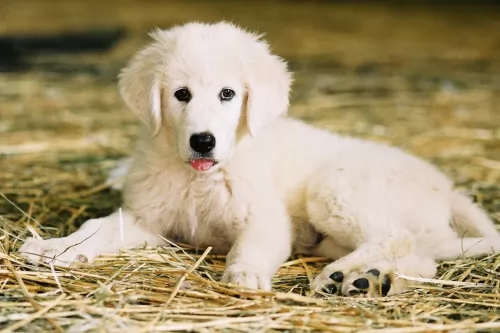 A height of Abruzzenhund variates between 60-73 cm, males are slightly bigger than females. While the weight is 30-45kg, again, males are heavier than females.
A height of Abruzzenhund variates between 60-73 cm, males are slightly bigger than females. While the weight is 30-45kg, again, males are heavier than females.
Abruzzenhund lifespan is between 11-13 years, but since these dogs don’t have any weaknesses and don’t tend to get sick, they can live longer with a proper care and adequate food and training.
Litter size of Abruzzenhund depends, but as any large breed, they usually have 6-9 puppies. And that is a very good considering size of the breed.
Abruzzenhund is not the only name of this breed. There are more names that you might hear. You can hear names like Maremma, Pastore, Abruzzese, Cane da Pastore, Maremmano- Abruzzese, Italian Sheepdog, and many similar names. Basically, they sound similar but there are differences.
Abruzzenhund is a friendly dog, but it is very powerful. Very strong jaw with a scissors bite makes them very strong. They have small but intelligent eyes, usually dark colored. The undercoat is dense, while the coat is white with segments of ivory to white yellow. Their long undercoat and coat make them winter resistant.
 As a spitz-type dog, with the Lundehund you’ll recognize the typical spitz-dog characteristics – the erect ears and the tail that curves over the back.
As a spitz-type dog, with the Lundehund you’ll recognize the typical spitz-dog characteristics – the erect ears and the tail that curves over the back.
He is a small to medium sized dog standing at 30 – 40cm and weighing 6 – 9kg. He is an active dog and is as agile as a fox.
He has a dense double coat which is white, reddish/tan with some black tips. He is a dog which sheds constantly.
Strangely this dog has 6 toes and his rear pads have elongated foot pads which have helped the dog be able to climb over rocks. He also has a flexible type of neck that is capable of craning back so that the head touches the spine. The dog has some unique features and wriggling in and out of small spaces is another of his characteristics. In fact he can do things that you would not imagine a dog could do.
When you have a Lundehund in your life you’ll agree he has a happy, amicable personality. He is non-aggressive.
He will require training and socialization as he is an independent dog who can be obstinate. He is quite aloof with strangers too and once he starts barking at them he tends to want to continue. Training him will put an end to that irritating behavior. He is a loving, loyal dog, enjoying the company of his human family.
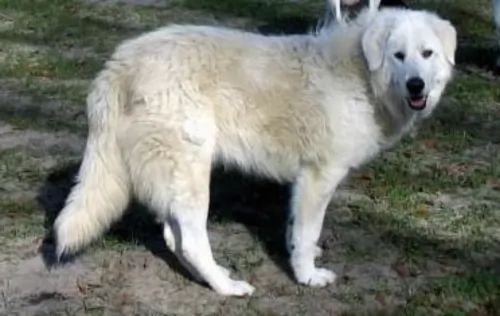 Abruzzenhund is a very well-balanced breed who loves spending time with other animals and people. They have a very good temper. They love being around families, and they are very gentle with children. It is important to train Abruzzenhund properly because the dog of that size should be a leader. A human with a strong character should train this breed. Training is important because they tend to make their own decisions which can be bad sometimes.
Abruzzenhund is a very well-balanced breed who loves spending time with other animals and people. They have a very good temper. They love being around families, and they are very gentle with children. It is important to train Abruzzenhund properly because the dog of that size should be a leader. A human with a strong character should train this breed. Training is important because they tend to make their own decisions which can be bad sometimes.
 The Norwegian Lundehund isn’t your everyday dog and in fact he is known as a primitive breed. Perhaps he wouldn’t be the best dog to have if you’re a first-time dog owners as training is quite difficult too.
The Norwegian Lundehund isn’t your everyday dog and in fact he is known as a primitive breed. Perhaps he wouldn’t be the best dog to have if you’re a first-time dog owners as training is quite difficult too.
People who are willing to take a chance on him say that with training and socialization he can become a loving canine companion.
 The Lundehund is prone to digestive disorders but even so he has got a good chance of living to be 11, 12, 13 or 14 years of age with good care.
The Lundehund is prone to digestive disorders but even so he has got a good chance of living to be 11, 12, 13 or 14 years of age with good care.
He is however, one of these dogs prone to health problems of which chronic intestinal disease is one. Its the kind of illness that can recur because it is resistant to treatment.
Experts on these dogs say that they should have a fecal test done every 6 months or so, saying that one thing a bit negative with this dog breed is that you may well be forking out quite a bit on chronic veterinary care.
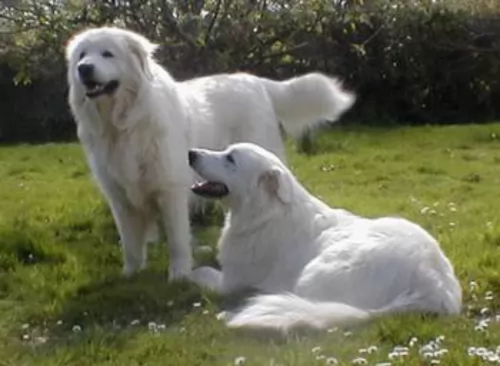 They learn very quickly, but it requires strong will and constant training to keep them happy. They are great working dogs, and with the positive training, they are amazing. It is very important that they follow rules and to keep them in balance with training.
They learn very quickly, but it requires strong will and constant training to keep them happy. They are great working dogs, and with the positive training, they are amazing. It is very important that they follow rules and to keep them in balance with training.
They can eat a lot of food, depend on their activity. High-Quality dog food twice a day for a grown dog is a must. While puppies should eat 3-5 times, smaller portions of food. The food is important especially for working dogs, they need up to 2000-3000Kcal per day. Abruzzenhund will enjoy eating meat with a lot of vegetables and oil.
They are not recommended for small house or apartment. They need big yard because they require a lot of space. During the winter they can be outside because of their coat, but during the summer they need to be in the shade with a lot of fresh water available anytime.
The coat should be brushed and groomed very often because they have a thick coat. There is a lot of dead and loose hair in it. During shedding, period takes even more time to groom your dog properly. They love and they need exercise. Mental exercise is important as physical. Every day walking, running, playing with other animals is an important part of dog's activity. When they get enough quality exercise, they will sleep in the house.
 Like any other dog, the Norwegian Lundehund will do well on the best quality food. If you buy him commercially manufactured food, check the ingredients on the packaging. Lots of these lower quality foods are made from ingredients that are toxic for your pet, so buy a good quality one.
Like any other dog, the Norwegian Lundehund will do well on the best quality food. If you buy him commercially manufactured food, check the ingredients on the packaging. Lots of these lower quality foods are made from ingredients that are toxic for your pet, so buy a good quality one.
Buy food according to your dog’s age and activity levels. To make his meals more interesting, add in some delicious home prepared food for him. Stay away from spicy, exotic foods and go for something like boiled chicken, brown rice and vegetables. Some raw meat added to the kibble from time to time can also do wonders for your pet as he requires a high-protein diet. Make sure he always has access to fresh, cool water.
Other ‘caring’ things to do to make sure your pet has a quality lifestyle is -
Brush his hair twice a week as he is a fairly heavy shedder. Not only does it keep the coat nice and shiny, it builds up a bond between you and your pet.
Check his ears and eyes regularly to make sure they are free from infection.
Clip his nails when they get long as your pet can hurt himself if the nails hook onto things.
Whenever he is ill, get him to the vet for a check-up.
Make sure he has a nice safe, dry, warm, snug place to sleep.
Keep him well exercised. A dog that is put into the backyard and more or less forgotten will be most miserable. Why get a pet if you don’t want to make him a 100% part of the family?